Congratulations to our three recipients of the W. D. Hamilton Award for Outstanding Graduate Student Presentation, Liming Cai, Sarah Khalil, and Arianna Kuhn! Because this competition was not held last year, this year’s competition included applicants who were eligible last year. Thank you to all of our finalists who presented their work in the Hamilton Award symposium at the Virtual Evolution meeting!
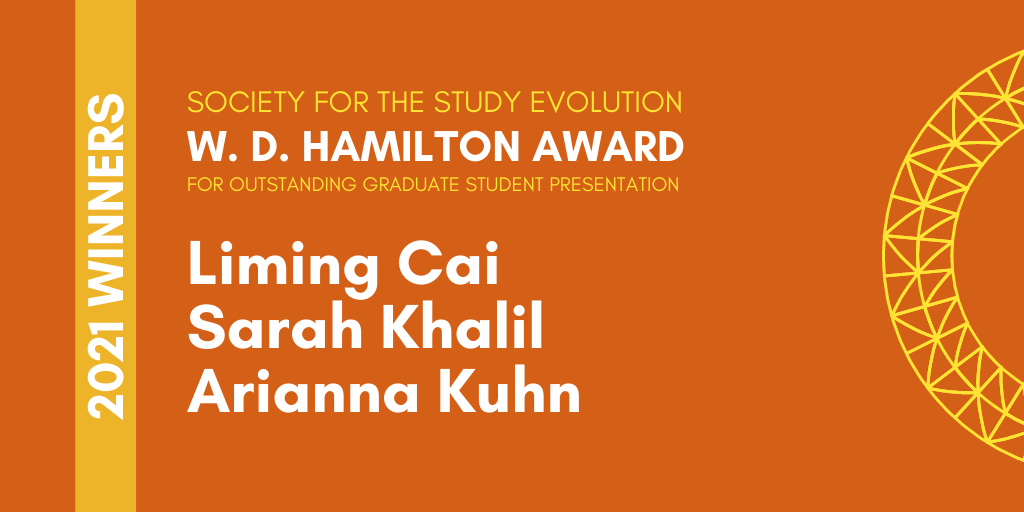
Congratulations to the 22 recipients of the 2021 Graduate Research Excellence Grant - R. C. Lewontin Early Award!
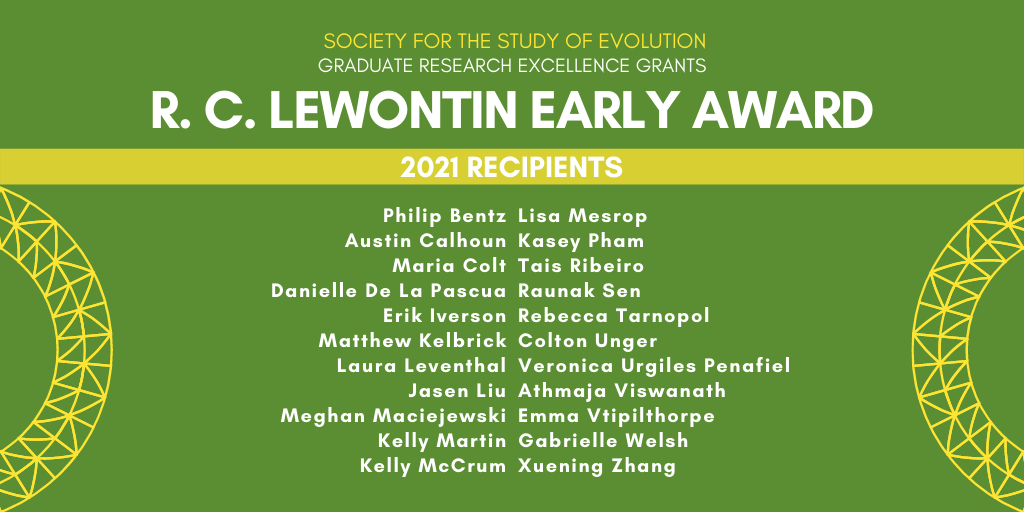
Awarded in memory of George W. Gilchrist*:
Tais Ribeiro, University of Maryland. Advisor: Anahi Espindola
Philip Bentz, University of Georgia. Advisor: Jim Leebens-Mack
Austin Calhoun, Illinois State University. Advisor: Ben Sadd
Maria Colt, University of Maryland. Advisor: Heidi Fisher
Danielle De La Pascua, University of California Davis. Advisor: Jennifer Gremer
Erik Iverson, The University of Texas at Austin. Advisor: Justin Havird
Matthew Kelbrick, University of Liverpool. Advisor: Siobhán O’Brien
Laura Leventhal, Stanford University. Advisor: Moises Exposito-Alonso
Jasen Liu, University of California, Davis. Advisor: Santiago Ramírez
Meghan Maciejewski, University of Illinois at Urbana-Champaign. Advisor: Alison Bell
Kelly Martin, University of Idaho. Advisor: Christine Parent
Kelly McCrum, University of Georgia. Advisor: Jill Anderson
Lisa Mesrop, University of California, Santa Barbara. Advisor: Todd Oakley
Kasey Pham, University of Florida. Advisor: Douglas Soltis
Raunak Sen, Cornell University. Advisor: Kerry Shaw
Rebecca Tarnopol, University of California - Berkeley. Advisor: Noah Whiteman
Colton Unger, University of Calgary. Advisor: Campbell Rolian
Veronica Urgiles Penafiel, Utah State University. Advisor: Molly Womack
Athmaja Viswanath, University of Toronto. Advisor: Asher Cutter
Emma Vtipilthorpe, North Carolina State University. Advisor: Seema Sheth
Gabrielle Welsh, University of Denver. Advisor: Robin Tinghitella
Xuening Zhang, Cornell University. Advisor: Anurag Agrawal
*This award was funded in part by donations to the George W. Gilchrist Student Support Fund.
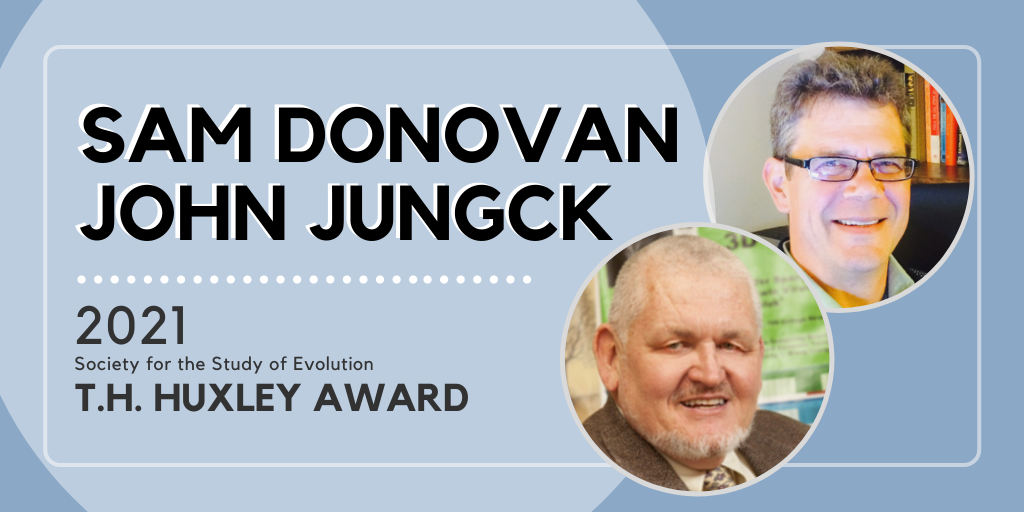
The SSE Education and Outreach Committee is pleased to announce the winners of the 2021 T. H. Huxley Award, Dr. John Jungck and Dr. Sam Donovan. This award recognizes and promotes the development of high quality evolution education resources. Dr. Jungck and Dr. Donovan are recognized for their activity, "Beagle Investigations Return with Darwinian Data (BIRDD) project." In the activity, students engage in evolutionary problem solving and explore their own research questions using primary scientific data from the Galapagos Islands and Darwin’s Finches. Read more here.
The Evolution Highlights series showcases some of the interesting and varied papers published within the last few years in Evolution. The goal of these Evolution Highlights is to let our readers learn more about how the highlighted study came into existence and to invite the authors to share stories and tips from the perspective of a recently published author. We welcome nominations and self-nominations for this series.
Here we highlight "Antibody-mediated crosslinking of gut bacteria hinders the spread of antibiotic resistance." Highlight by Anne-Florence Bitbol and Claude Loverdo.
The Evolution Highlights series showcases some of the interesting and varied papers published within the last few years in Evolution. The goal of these Evolution Highlights is to let our readers learn more about how the highlighted study came into existence and to invite the authors to share stories and tips from the perspective of a recently published author. We welcome nominations and self-nominations for this series.
Here we highlight "Comparing individual and population measures of senescence across 10 years in a wild insect population." Highlight by Tom Tregenza.
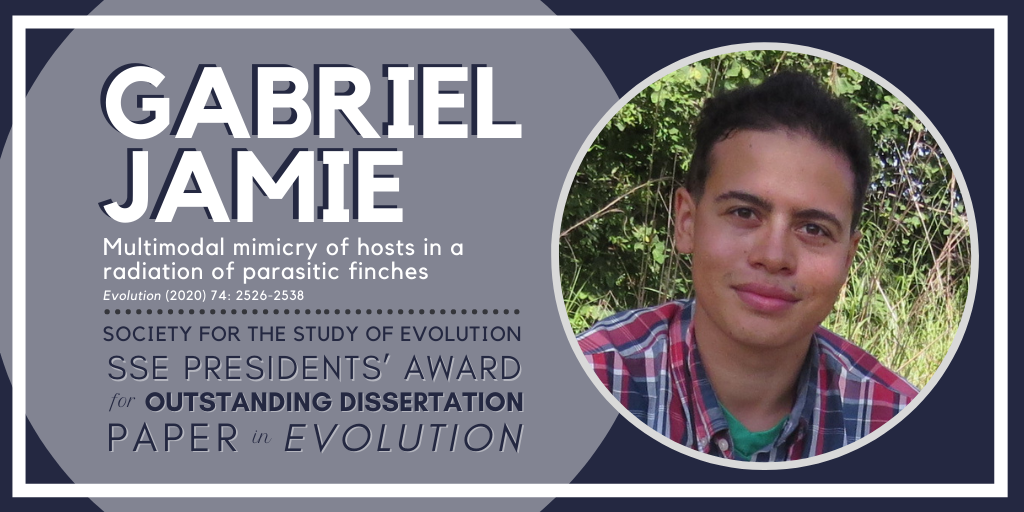
2021 SSE Presidents’ Award for Outstanding Dissertation Paper in Evolution
Congratulations to Dr. Gabriel Jamie, recipient of the 2021 SSE Presidents’ Award for Outstanding Dissertation Paper in Evolution, for his paper, “Multimodal mimicry of hosts in a radiation of parasitic finches,” Evolution (2020) 74: 2526-2538.
In this paper, Dr. Gabriel Jamie and co-authors investigated host-specific multimodal mimicry by nestlings of brood-parasitic Vidua indigobirds and whydahs to assess their role in adaptation to novel hosts. The premise was that imprinting of parasitic nestlings on their hosts promotes the maintenance of specialized host-parasite associations over generations. This exposes lineages to consistent selection from host species that could allow host-specific nestling adaptations to evolve. Over four rainy seasons in Zambia, Dr. Jamie and his research assistants recorded aspects of nestling morphology and behavior, and developed a new methodology to quantify phenotypes. Remarkable matching was found in the patterns and colors of the parasitic nestlings and the nestlings of their different host species, whose diverse appearances can be seen in the cover photo of the issue (74:11). The team also found matching in the sounds and postural movements of the nestlings. This study shows that imprinting can lead to the evolution of host-specific mimetic adaptations that can generate pre- and post-zygotic isolation and contribute to sympatric speciation. Dr. Jamie earned his Ph.D. at the University of Cambridge, where he is now a BBSRC-funded post-doctoral research associate. He is also a research associate of the FitzPatrick Institute of African Ornithology at the University of Cape Town.
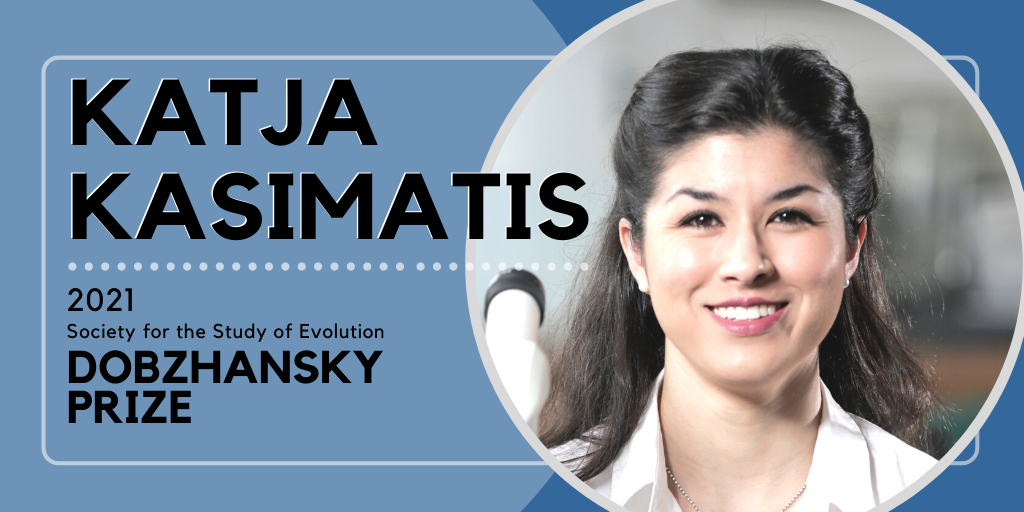
2021 Dobzhansky Prize
Congratulations to the 2021 Dobzhansky Prize winner, Dr. Katja Kasimatis! Dr. Kasimatis is a Banting Postdoctoral Fellow in the Cutter and Rowe labs in the Ecology and Evolutionary Biology Department at the University of Toronto. Her research focuses on the evolutionary consequences of sex-specific selection and sexual conflict, specifically the impact on genome evolution. She pursues this research using a wide variety of approaches including molecular genetics, proteomics, genomics, bioinformatics, experimental evolution, and theoretical population genetics. Her work expands our understanding of sexual conflict and furthered nematodes as a model system for reproductive dynamics. While pursuing her research, she works to foster a diverse, equitable, and inclusive community both within and beyond her department.
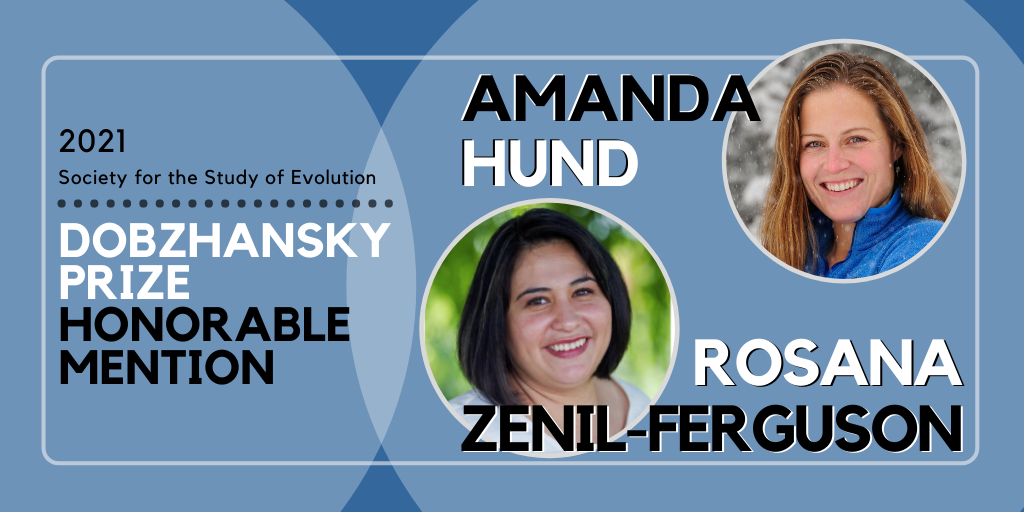
2021 Dobzhansky Prize Honorable Mentions
Congratulations to the 2021 Dobzhansky Prize Honorable Mentions, Dr. Rosana Zenil-Ferguson and Dr. Amanda Hund. Dr. Zenil-Ferguson is an Assistant Professor in the School of Life Sciences at the University of Hawaii Manoa. Her research focuses on evaluating the role of polyploidy across angiosperms through the development of stochastic models and statistical tools. While conducting her research, she focuses on promoting diversity and creating space for early career scientists within the macroevolution modeling field through mentorship and workshops. Dr. Hund is a JSMF Postdoctoral Fellow in the Department of Ecology, Evolution, and Behavior at the University of Minnesota and is starting as an Assistant Professor at Grinnell College next year. Her research focuses on understanding how parasites shape the evolution of their hosts, and has broad applications for understanding interactions between the environment and developmental processes. In her work, Dr. Hund focuses on promoting effective undergraduate mentorship through courses and research experiences.
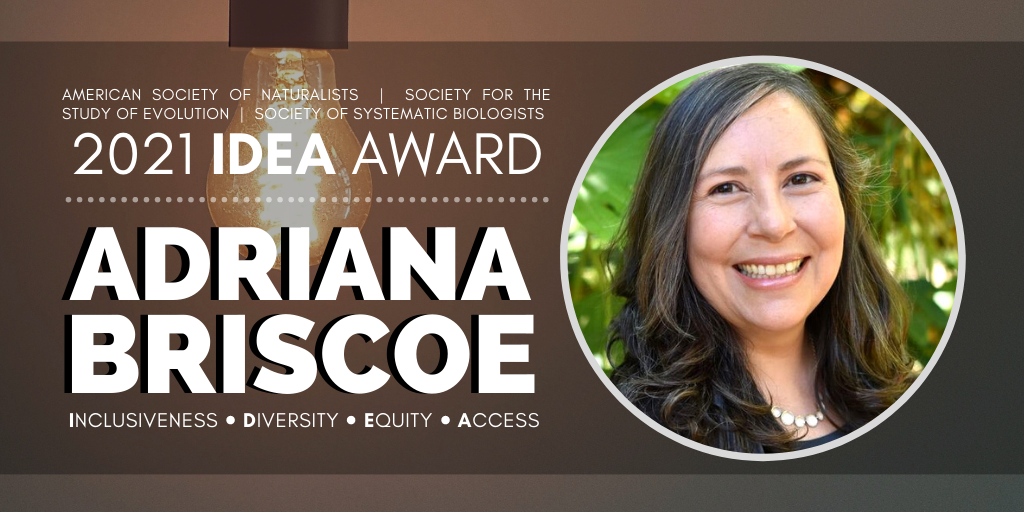
Congratulations to Dr. Adriana Briscoe, recipient of the second annual ASN/SSE/SSB Inclusiveness, Diversity, Equity, and Access (IDEA) Award. Over her entire career, Dr. Briscoe has shown a commitment to diversity, equity and inclusion that has resulted in the recruitment and retention of diverse scientists in the evolution workforce at all professional levels. Dr. Briscoe also contributes to international inclusion, regularly publishing research with co-authors from global south countries. Her DEI work also includes published scholarship and popular media related to her outreach. Dr. Briscoe has also been recognized for her research excellence and contributions to education by the largest STEM diversity organization in the country, the Society for the Advancement of Chicanos/Hispanics and Native Americans in Science (SACNAS). Thank you to Dr. Briscoe for your commitment and contributions to the community!
The SSE Graduate Student Advisory Council (GSAC) is in search of three student members to serve in the 2022 cohort. The GSAC represents student and postdoc interests to the SSE Council and facilitates interaction among students and postdocs, and between students, postdocs, and mentors. Their goal is to be a source of information for students and postdocs during their graduate school career and as they make career transitions, and to provide an early-career perspective to the rest of the SSE council. GSAC members must be graduate students at the time of application, at least one year into their PhD program, and members of SSE. Applicants should be organized, possess leadership skills, and be interested in working with SSE council and members to contribute to the Society. We strongly encourage those with non-traditional pathways to graduate school, those from non-R1 universities, and those from outside the United States to apply. Learn more on the GSAC page and submit your application by April 22, 2021.
 Story Collider is returning for Virtual Evolution 2021! This event will take place Thursday, June 24 at 7:00 PM EDT and will feature three people sharing true, personal stories about science on the theme “Stories of 2020.” Continue reading to learn more about how to submit your story. Deadline: April 22, 2021.
Story Collider is returning for Virtual Evolution 2021! This event will take place Thursday, June 24 at 7:00 PM EDT and will feature three people sharing true, personal stories about science on the theme “Stories of 2020.” Continue reading to learn more about how to submit your story. Deadline: April 22, 2021.
Stories are powerful. Whether hilarious or heartbreaking, subversive or soothing, it matters who takes the stage and what stories are told. We want to hear yours!
On June 24, The Story Collider will host a very special virtual edition of our live show at Evolution 2021. We are searching for three people to share true, personal stories about science, on the theme "Stories of 2020." 2020 was the year (decade?) that just wouldn't end. We'd like to hear how the many events of 2020 (COVID, the national reckoning with racism, politics, wildfires, etc.) impacted your life and science.
If you’d like to pitch us, all you need at this point is the seed of an idea for your story. It can be about almost anything: an important experiment, a rough day in the field, misadventure, love, loss, or more, but it must be about you. Our format does not include slides or props. It’s not the place for lectures. It’s about lived experiences. If you’re selected for the show, experienced Story Collider producers will work with you for several weeks in advance to help you prepare. Send us your pitch here: https://airtable.com/shrhVNgUxa8gCMdS3 The deadline for pitches has been extended to April 30, 2021. If you are curious or would like some inspiration, read more at https://www.storycollider.org/submissions or browse The Story Collider podcast archive at https://www.storycollider.org/podcasts.
The Society for the Study of Evolution, the American Society of Naturalists, and the Society of Systematic Biologists stand in solidarity with the many Asian, Asian-American, and Pacific Islander communities and vehemently condemn these acts of domestic terror. To our Asian, Asian-American, and Pacific Islander members: we support and respect you. We will continue the work of transforming our Societies into safe and inclusive places for you, and for all members of our communities.
The murders of Soon Chung Park, Hyun Jung Grant, Suncha Kim, Yong Ae Yue, Xiaojie Tan, Daoyou Feng, Delaina Ashley Yaun, and Paul Andre Michels in the Atlanta area are symptoms of violent anti-Asian racism, which has only increased since the onset of the pandemic in the United States last year. These events are widespread. Across the country, Asian elders are being attacked in the streets with increasing frequency. Asian and Asian-American communities have been living with heightened anxiety and fear every day. Asian women in particular have been the targets of these violent and racist attacks. We are outraged seeing perpetrators of these hate crimes once again excused at the expense of their victims, enabling continuous xenophobic and racist violence in the U.S.
We call on our largely white membership to capitalize on their privilege to support their colleagues. We must deny comfort and complacency in the midst of oppression by engaging in self-reflection and active anti-racism. Be vocal and openly expose and reject racism, prejudice, and exclusion in all forms both inside and outside academic spaces. Please reach out to those you mentor and the students in your classes. Tell them you condemn these acts and share resources where they can get support. Work with your trainees to make your shared spaces safe and welcoming for people of Asian descent. Learn the history of U.S. anti-Asian policy, military occupation, and colonialism at the root of these issues. There are endless resources, but here is one place to start: https://anti-asianviolenceresources.carrd.co/.
This violence is not external to our community and our scholarship. Some members of our community have been directly harmed, while others, also within our community, have caused some of this harm. There are numerous ways to practice effective allyship, and we include several useful resources below. If you want to learn more, you may be interested in following these Twitter accounts: ;@stopaapihate, ;@aapiwomenlead. Professional societies have a substantial role in making shared spaces welcoming and safe for all.
If you have been affected by violence and/or racist actions, please feel free to share your concerns and suggestions with our leadership. We need your input, feedback, and criticism to better support all of our scientists, especially those who have been actively excluded for so long. You can reach the society committees focusing on this work at these email addresses: diversity@evolutionsociety.org, asndiversity@gmail.com, diversitydirector@systematicbiologists.org
Some Resources:
Asian Americans Advancing Justice
OCA - Asian Pacific American Advocates National Center
Anti-Asian Violence Resources
Free Bystander Intervention Training
How to Be an Active Bystander When You See Casual Racism
Ten simple rules for building an antiracist lab
Black and Asian-American Feminist Solidarities: A Reading List
Anti-Asian racism and COVID-19
Anti-Racism Resources for the AAPI Community
Stop AAPI Hate website for reporting hate incidents
Tri-society Diversity Committees
SSB DEI Committee and Standing Against Racism Statement
ASN Diversity Committee and Statement on Anti-Black Racism
SSE Diversity Committee and Statement Against Racial Injustice
Correction: An earlier version of this statement incorrectly stated the names of Soon Chung Park, Hyun Jung Grant, and Yong Ae Yue. We sincerely apologize for the error.

Registration is now open for the Virtual Evolution 2021 conference on June 21-25! Talk submissions are open until April 30 or until all slots are filled. All talks must be recorded by June 1.
Talks and Events
Scheduled events will run from 10:00 AM to 7:00 PM Eastern time. See the Schedule Overview for more details.
Plenaries: Each day will be highlighted by a live-streamed plenary. On Friday, the 25th, we will live stream award symposia and talks. All live events will be available to view afterwards with English, Spanish, or no captions.
Faux-Live Talks: Pre-recorded, synchronous talks. These 10-minute talks will be grouped into sessions with live discussion sessions after each group. Talks will also be available to view afterwards. All talks submitted before the cap is reached will be accepted (up to ~1000). These talks can be given in English or Spanish, and can be viewed with English, Spanish, or no captions.
On-Demand Talks: Pre-recorded talks, 6 minutes each. These talks will be available to view any time, much like browsing a set of posters. All talks submitted before the cap is reached will be accepted (up to ~800). These talks can be given in English or Spanish, and viewed with English, Spanish, or no captions.
Workshops: We are offering many of our familiar workshops, as well as some new ones. Topics include science communication, writing an NSF proposal, finding a postdoc, language barriers in science, public policy, and more! See the meeting website for more details.
Networking Opportunities: This meeting will offer many opportunities to connect with your colleagues. There will be open networking “lounges”, post-talk discussion sessions, postdoc and grad student-faculty networking “lunches”, and a variety of socials, including an international mixer for members outside the US, the John Edmonstone Coffee Social for BIPOC Scientists and Allies, the LGBTQ+ and Allies Super-Awesome Trivia Treasure Hunt, a PUI mixer, a mixer for biologists with disabilities/chronic illness/Deaf biologists and allies, and a Latinxs in evolution mixer. Story Collider is also back by popular demand. See the meeting website for more details.
Important Dates
April 15: Deadline for the SSE Hamilton Award for Outstanding Graduate Student Presentation
April 30: Deadline for faux-live and on-demand talk submissions (or earlier if capacity is reached)
June 1: Deadline for uploading recorded talks (or recording them using the meeting app)
SSE Member Registration Rates
Undergraduate/Graduate Student: $10 USD
Postdoc: $50 USD
Faculty/Professional: $125 USD
Every Evolution conference (including this one) is budgeted to break even. What does my registration pay for?
Global Participation Program
We are pleased to offer free meeting registration for up to 200 society members from 139 countries and territories around the world. All SSE members who joined through the Global Membership Assistance Program are eligible! Learn more here.
Bilingual Mentor Program
For Evolution 2021, we will pair non-native English speakers with bilingual mentors. Mentors and mentees will meet before the conference to provide advice, work on presentations, and aid in translation. Indicate interest in mentoring or receiving mentorship during registration. Más información está disponible aquí.
Undergraduate Mentor Program
Graduate students and postdocs are encouraged to sign up to be a mentor for an undergraduate student through the virtual Undergraduate Day program. This program is an impactful but relatively low time-commitment opportunity to help undergrads feel at home in our Evolution community. Sign up during registration!
Safe Evolution
The Council of Evolution Societies (ASN, SSE, and SSB) are committed to promoting a safe, inclusive, and professional environment at Virtual Evolution 2021 through Safe Evolution. This program was designed to establish standards of appropriate behaviors, to address work-climate related concerns, and to offer support to members who may feel harassed, threatened or unsafe in any way when participating in joint meeting programs. If we all engage, we can make the Evolution meetings a professional and meaningful experience for everyone. Learn more on the Safe Evolution page.
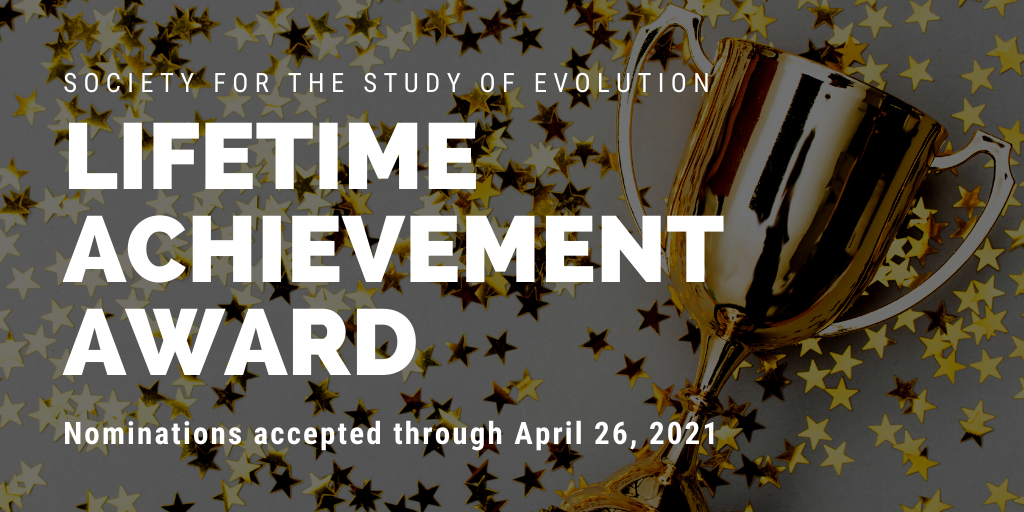
The Society for the Study of Evolution is pleased to announce the 2022 Lifetime Achievement Award for evolutionary biologists. The award recognizes individuals who have made substantial contributions to the study of evolution, who have demonstrated outstanding mentorship of trainees, and/or who have provided noteworthy service to the evolution community. The awardee will be chosen this summer and will be presented at the 2022 Evolution meeting in Cleveland, OH.
Complete the form below with your name and the nominee’s name. Nominators are asked to provide a short (250 words or less) statement in support of the nominee. You will also be asked if you would be willing to provide a longer and more detailed nomination letter at a later date. SSE values the contributions of diverse researchers and encourages nominators to consider all potential mentors and colleagues. Self-nominations are welcome. Please submit your nomination by April 26, 2021.
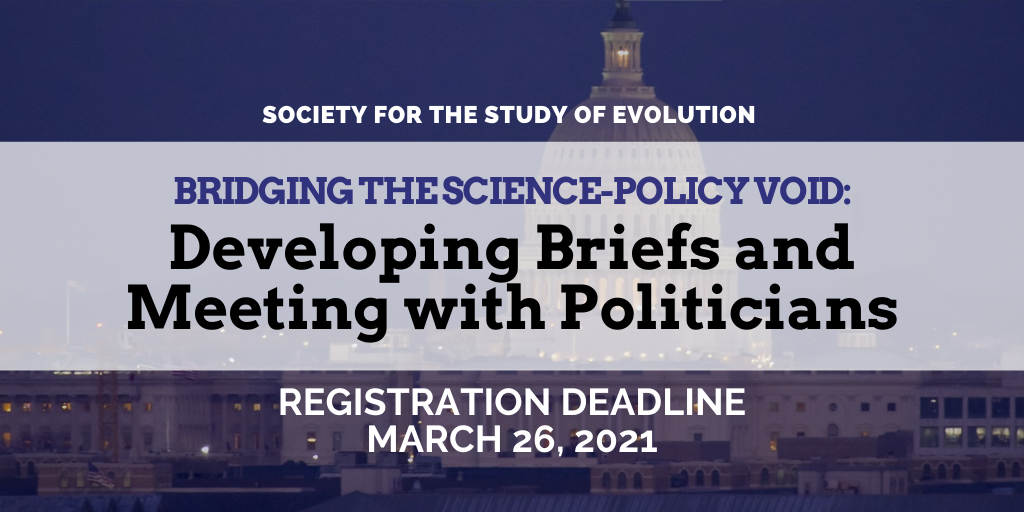
Bridging the Science-Policy Void: Developing Briefs and Meeting with Politicians
Do you think science should influence policy? Do you have a particular issue that you would like to bring to the attention of policymakers? Sign up for an online policy training session hosted by the SSE Public Policy Committee. Participants will learn how to write a brief and meet with a policymaker, and then will apply what they learned by generating a policy brief about an issue of their choosing to share with a policymaker. Following training, participants will be tasked with virtually meeting with a policy maker to discuss the issue raised in their policy brief. Upon completion, you will receive a letter of completion and up to $50 towards reduced or free registration at the Virtual Evolution 2021 meeting.
The training will include pre-recorded synchronous talks hosted by former SSE Public Policy Committee Chair Dr. Sally Otto, with live discussions led by committee members Drs. Courtney Fitzpatrick, Sally Otto and Matthew Rubin. Pre-recorded material will include talks from Drs. Robert Gropp, Jo Handlesman, Alexandra Lawrence and Robert Pennock. Training will take place online in a series of four one-hour sessions every two weeks during April and May, with exact dates depending on the availability of participants. Registration is free and is limited to 15 participants, who must be members of the Society for the Study of Evolution, the American Society of Naturalists, or the Society of Systematic Biologists (SSE membership waiver available upon request). Sign up here before March 26: https://forms.gle/98reQ5TndB94221X7
Update: This workshop is now full. Thank you!
In the New Faculty Profiles, we invite highlighted faculty to discuss their research, describe how SSE has impacted their career, and share any tips or stories they may have for other researchers. This month we highlight Dr. Sangeet Lamichhaney.
In the New Faculty Profiles, we invite highlighted faculty to discuss their research, describe how SSE has impacted their career, and share any tips or stories they may have for other researchers. This month we highlight Dr. Corlett Wood.
This award offers free two-year SSE memberships to 100 individuals of any career stage who identify as racial or ethnic minorities, either in their country of origin or their country of residence. This initiative is part of SSE Council’s 2020 commitment to actions to increase inclusion of and support for members of historically excluded groups, particularly individuals who identify as Black, Indigenous, or people of color (BIPOC), in all of the society’s activities and programs, and in evolutionary biology as a whole.
Learn more and apply here.
The Society for the Study of Evolution (SSE) Education Committee is pleased to announce the 2021 T.H. Huxley Award, named in honor of Darwin's very public supporter, which recognizes and promotes the development of high quality evolution education resources. If you have an interesting project or educational activity to share, consider applying for this award. Graduate students and postdoctoral fellows are encouraged to apply.
This award provides funding for an SSE member to present evolution education resources at the National Association of Biology Teachers (http://nabt.org/) annual conference. This year’s NABT conference will be held November 11 - 14, 2021 in Atlanta, GA.
Applications are due April 4. Learn more and apply here.
The SSE Graduate Student Advisory Council (GSAC) is in search of three student members to serve in the 2022 cohort. The GSAC represents student and postdoc interests to the SSE Council and facilitates interaction among students and postdocs, and between students, postdocs, and mentors. Their goal is to be a source of information for students and postdocs during their graduate school career and as they make career transitions, and to provide an early-career perspective to the rest of the SSE council. GSAC members must be graduate students at the time of application, at least one year into their PhD program, and members of SSE. Applicants should be organized, possess leadership skills, and be interested in working with SSE council and members to contribute to the Society. We strongly encourage those with non-traditional pathways to graduate school, those from non-R1 universities, and those from outside the United States to apply. Learn more on the GSAC page and submit your application by April 15, 2021.
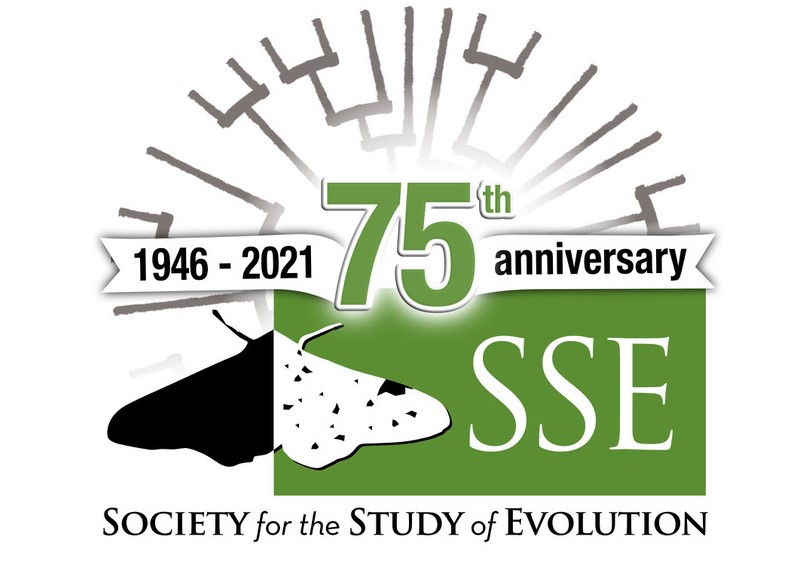
This year marks 75 years since SSE was founded. To celebrate, we are publishing a special series of Perspectives and Commentaries in Evolution. In January and February we present articles to celebrate SSE’s recent history and impacts, and to provide an important assessment of diversity within our field. Over subsequent months, we are publishing articles to highlight key scientists in the field, as well as to celebrate Evolution papers that have had major impacts in the fields of adaptation, coevolution, speciation and macroevolution. Learn more about the history of SSE here and read the special articles as they come out here.
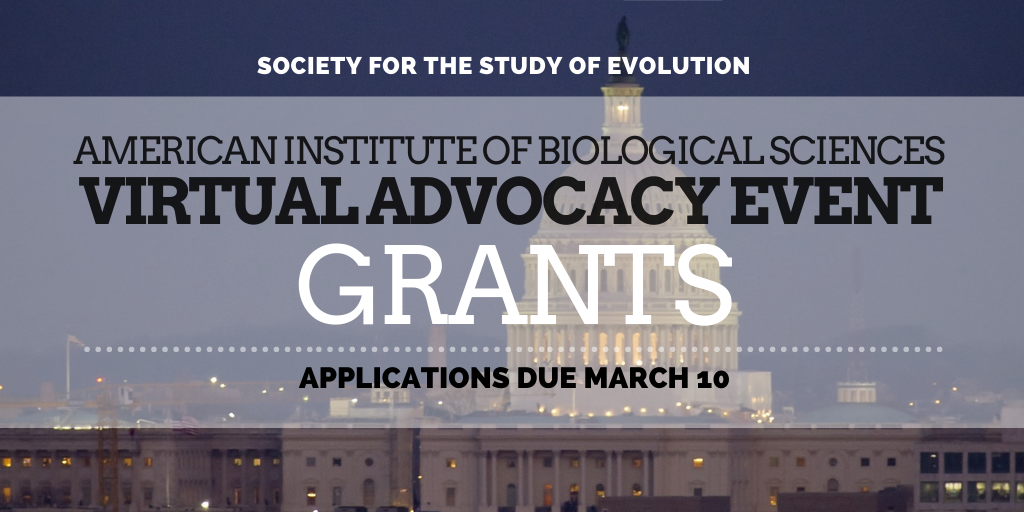
The SSE Public Policy Committee is pleased to offer grants to SSE members to attend the American Institute of Biological Sciences (AIBS) 2021 Virtual Advocacy Event, comprised of a Communications Boot Camp for Scientists (April 19-20, 2021) and Congressional Visits Day (April 21-23). In addition to the training, participants will speak with their elected congressional representatives during virtual meetings organized by AIBS. Scientists and graduate students who are interested in communicating the importance of federal investments in scientific research and education to lawmakers are encouraged to participate in this valuable workshop. Funding will cover the cost of registration. To apply, please complete this application including a brief (<250 words) statement describing your interest in participating in federal policy making and what issues you would like to address. We especially encourage applications from individuals belonging to historically excluded groups. Applications are due March 10, 2021. Read statements from previously funded participants here.
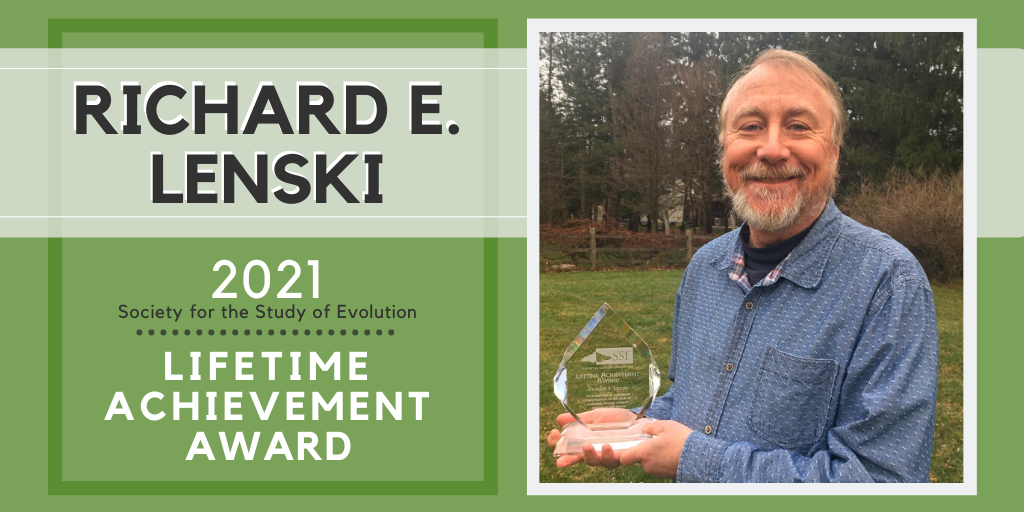
We are pleased to announce the recipient of the second annual SSE Lifetime Achievement Award, Dr. Richard E. Lenski. The Lifetime Achievement Award was created to recognize individuals who have made substantial contributions to the study of evolution, who have demonstrated outstanding mentorship of trainees, and/or who have provided noteworthy service to the evolution community. Dr. Lenski is the John Hannah Distinguished Professor of Microbial Ecology at Michigan State University (MSU). For more than 30 years, he has directed one of the most significant experiments in evolutionary biology, the E. coli Long Term Evolution Experiment (LTEE). He is one of the founding members of the BEACON Center for the Study of Evolution in Action at MSU, and today serves on its executive committee. Dr. Lenski has previously received a Guggenheim Fellowship and a MacArthur Fellowship, and has been elected to the American Academy of Microbiology, the European Molecular Biology Organization, the American Academy of Arts and Sciences, and the National Academy of Sciences. In addition to his outstanding research contributions, he is known for being an exceptional mentor and role model. He also served the community as President of SSE in 2013. Congratulations, Dr. Lenski!
The SSE Dobzhansky Prize recognizes the accomplishments and future promise of an outstanding young evolutionary biologist. PhD recipients who were awarded their degree between January 1, 2017 and January 1, 2021 are eligible. The committee will consider circumstances that may extend eligibility (e.g., parental leave) and encourages nominations of biologists from historically under-represented groups. Potential applicants should contact committee chair Sarah Schaack at secretary@evolutionsociety.org with any questions about eligibility. Deadline extended to February 14.
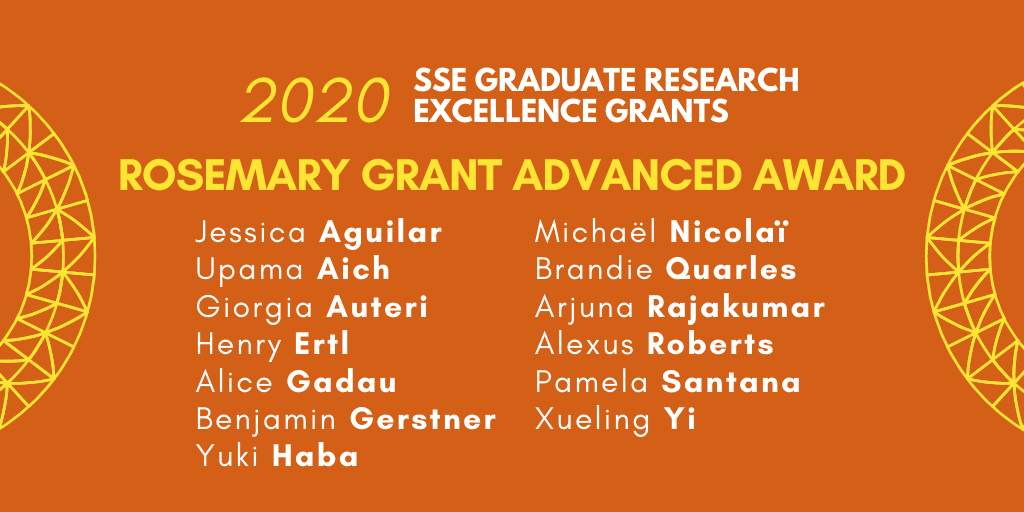
Congratulations to our 13 recipients of the Graduate Research Excellence Grants (GREG) Rosemary Grant Advanced Awards! These awards are to assist students in the later stages of their Ph.D. programs by providing funding to enhance the scope of dissertation research, such as to conduct additional experiments or field work. Thank you to all our applicants. We received many excellent applications. Two awards were funded through donations to the George Gilchrist Student Support Fund. Thank you to all who donated!
Rosemary Grant Advanced Awards in memory of George Gilchrist:*
Jessica Aguilar, University of California Berkeley. Advisor: Noah Whiteman
Brandie Quarles, Duke University. Advisor: Kathleen Donohue
Rosemary Grant Advanced Award Recipients:
Upama Aich, Australian National University. Advisor: Michael Jennions
Giorgia Auteri, University of Michigan. Advisor: L. Lacey Knowles
Henry Ertl, University of Michigan. Advisor: Patricia Wittkopp
Alice Gadau, The Rockefeller University. Advisor: Li Zhao
Benjamin Gerstner, University of New Mexico. Advisor: Ken Whitney
Yuki Haba, Princeton University. Advisor: Carolyn McBride
Michaël Nicolaï, Universiteit Gent. Advisor: Matthew Shawkey
Arjuna Rajakumar, McGill University. Advisor: Ehab Abouheif
Alexus Roberts, University of California, Davis. Advisor: Peter Wainwright
Pamela Santana, Universidade De Sao Paulo. Advisor: Paulo Guimarães Jr.
Xueling Yi, University of Wisconsin-Milwaukee. Advisor: Emily Latch
*These awards were funded by donations to the George Gilchrist Student Support Fund.
We are pleased to announce a call for proposals for local and regional educational outreach activities to take place during 2021. It is our hope that these projects will lead to ongoing outreach collaboration in future years. Preference will be given to new collaborations, but extensions of previous projects that have evidence of success are allowed. Applicants must be members of SSE. We expect to award up to $1000 USD to 5 to 10 projects Proposals will be accepted until February 20, 2021.